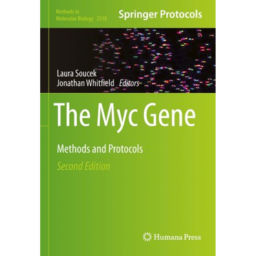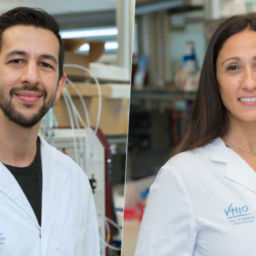
Mariano F. Zacarías Fluck, Research Associate of VHIO’s Mouse Models of Cancer Therapies, and co-First Author of this present study.
Recently published in Life Science Alliance -an open-access, peer-reviewed and online journal founded by an alliance of EMBO Press, Rockefeller University Press, and Cold Spring Harbor Laboratory Press- a Research Article* first-authored by VHIO investigators, reveals that only the lack of the Wnt signaling receptor Fzd9, formerly described as a Myc transcriptional target, debilitates sustained tumor growth and β-cell dedifferentiation in a mouse model of Myc-driven insulinoma.
Co-first authored by Mariano F. Zacarías Fluck, Research Associate of VHIO’s Mouse Models of Cancer Therapies, directed by Laura Soucek, and Toni Jauset (formerly a graduate student of Laura’s group and later, a researcher at VHIO-born spin-off Peptomyc S.L**., also led by Laura Soucek), findings reported in this present study show how genetic knock-out of Fzd9 permits pancreatic islets to maintain their physiological make up and impacts on Myc-related global gene expression.
Similarly, results show that also pharmacological inhibition of Wnt signaling in Fzd9-competent mice largely recapitulates the suppression of proliferation caused by Fzd9 deficiency upon Myc activation. Collectively, these findings indicate that the Wnt signaling receptor Fzd9 is essential for Myc-induced tumorigenesis in pancreatic islets.
“As has been widely reported in the literature, Wnt signaling is a major driver of cancer. Wnt pathway inhibition by targeting frizzled proteins as receptors present in this particular pathway, has therefore been proposed as a possible strategy to put the brakes on cancer growth and tumorigenicity” observed Mariano F. Zacarías, lead author of the study.
He continued, “Since the Fzd9 receptor is a Myc target, we sought to establish whether by inhibiting only this receptor in Myc-induced tumorigenesis in vivo could have a significant therapeutic impact while reducing the potential side effects associated with the simultaneous inhibition of multiple Frizzled family members.”
This research, directed by Laura Soucek, explored the implication of Fzd9 in mediating and maintaining Myc oncogenic function in β-cell tumors. By revealing that Fzd9 plays a critical role in the development of Myc-driven insulinomas, the researchers have, for the first time, identified a novel link connecting Myc and the Wnt pathway, which seems to be a required effector of Myc oncogenic activity in β-cell tumorigenesis.
Importantly, by pointing to Fzd9’s potential as valuable target when up-regulated in Myc-driven tumors, these present findings challenge previous reports that do not consider Fzd9 targeting as a feasible therapeutic approach due to its dual pro- and anti-tumorigenic properties.
“Our findings suggest a cross-talk where Wnt/ β-catenin signaling activates Myc, and Myc, in turn, activates Wnt/ β-catenin signaling through Fzd9. Identifying Fzd9 as a key Myc-driven tumorigenic effector provides us with a new actionable target for cancer treatment.” concluded Laura Soucek, Corresponding Author of this study and an ICREA Research Professor.
This research was supported in part by funding received from the Juan de la Cierva program of the Spanish Ministry of Economy and Competitiveness, the Generalitat de Catalunya – the Government of Catalonia’s AGAUR programme, and the Fero Foundation.
###
References:






















